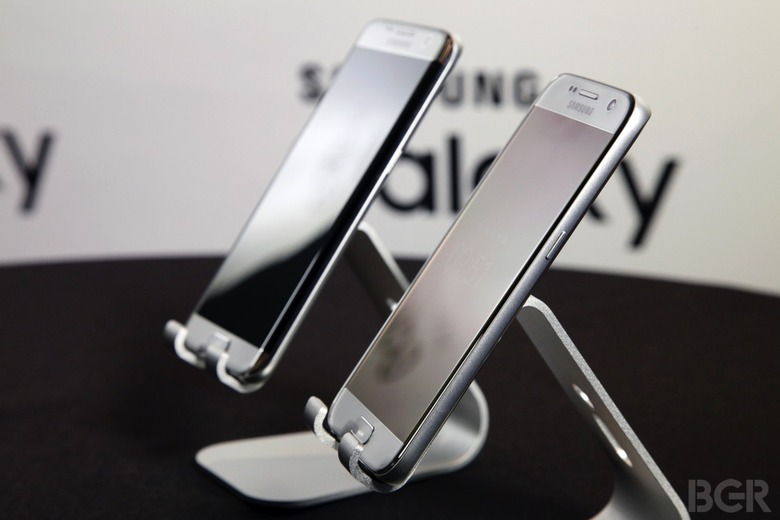15 Galaxy S7 Features The iPhone 6s Doesn't Have
The worst-kept secret of the beginning of the year is not a secret anymore. Samsung on Sunday evening announced the Galaxy S7 family of devices during a terrific show in Barcelona. The Galaxy S7 might be considered an "S" generation compared to its predecessor, but this is clearly Samsung's best phone yet, ready to offer some great features. Oh, and it's absolutely amazing to hold in your hand, in addition to being very snappy to use.
The Galaxy S7 will soon hit stores and will hopefully help Samsung better compete against the iPhone 6s phones until Apple comes out with something better. And the Galaxy S7 does have some great features that the iPhone 6s or iPhone 6s Plus do not.
DON'T MISS: Galaxy S7 and S7 edge hands-on: 2016's Androids to beat just might be unbeatable
High-resolution AMOLED displays
Both the Galaxy S7 and Galaxy S7 edge feature 2560 x 1440 Super AMOLED displays that outclass the iPhone 6s and iPhone 6s Plus when it comes to image clarity. Rumors suggest the iPhone will move to AMOLED screen tech in the future, and we can't wait for it.
Always-on Display
That AMOLED display also lets Samsung turn on only select pixels on the screen to offer users key info like the time, calendar and information about notifications.
Water and dust resistance
The Galaxy S7 has an IP68 rating that makes it water-resistant and dust-proof. And it's all done from the inside out, as Samsung revealed on the stage. Apple is also taking some steps in this regard, and its recent iPhones are more resistant to water damage — though they don't have the same certification as the Galaxy S7.
MicroSD support
Yes, the Galaxy S7 has expandable memory, a feature many people want. iPhones never had this perk, so iPhone users won't really feel like they're missing out on anything.
Double the RAM
The Galaxy S7 packs an impressive 4GB of RAM, though it'll be interesting to see whether that much RAM can help it deliver better performance than its predecessor. Meanwhile, the iPhone 6s has 2GB of RAM.
Better camera aperture
At f/1.7, the camera's aperture beats the iPhone 6's f/2.2 aperture and should help Samsung produce better low-light pictures. At least, that's what Samsung said on stage on Sunday, clearly firing a few shots at the iPhone in the process.
Bigger pixels
Samsung said on stage its camera pixels are 30% larger than the ones in the iPhone 6s Plus. That's 1.4-micron pixels for Samsung, compared to 1.22-micron for Apple.
Faster auto-focus
Samsung also jabbed at Apple during the show for the S7 camera's ability to focus quickly, particularly in low lighting conditions.
Dual-pixel tech
Samsung has apparently brought Canon's dual-pixel technology to its Galaxy S7 flagships, which lets it use all of its pixels to focus and capture light at the same time.
Water-cooling
Samsung seriously upgraded CPU and GPU performance, touting 30.5% CPU and 63.9% GPU improvements over the Galaxy S6. So the company is using a new way of cooling the flagship: water-cooling like you'd find on desktops and other more advanced devices. That's something the iPhone definitely doesn't have.
Bigger batteries
Well, the Galaxy S7 and Galaxy S7 edge are larger than the iPhones, and they're thicker too. That means they pack bigger batteries than the iPhone 6s and iPhone 6s Plus, so no surprises there. Samsung said you can binge a whole season of Game of Thrones on a single charge.
Faster charging
The Galaxy S7 features fast-charging battery technology, which can be disabled and enabled depending on user preferences. The iPhone 6s doesn't offer a similar feature.
Faster wireless charging
The new iPhones don't have native wireless charging features – though we taught you how to add the nifty feature yourself some time ago. But the Galaxy S7's battery can charge faster than other devices, the company says, using either regular or wireless charging.
Wider-reaching wireless payments
Because Samsung doesn't need NFC support to enable Samsung Pay, you can argue that its wireless payments product is superior to the iPhone, though it's likely that Apple Pay transactions still outscore Samsung Pay. Even so, Samsung announced a massive Samsung Pay expansion, revealing that many additional markets will get Samsung Pay support soon.
Virtual reality
Samsung is forging ahead when it comes to its VR endeavor. The company's entire event had VR in focus, with each person in attendance having a Gear VR attached to his or her. The Galaxy S7 was probably the first smartphone to be unveiled in VR, and Samsung even brought Facebook's CEO Mark Zuckerberg on stage while everyone's face was covered with the Gear VR headset, precisely to explain the social aspect of VR and the renewed Oculus Samsung partnership.
Apple is interested in the VR space, but it has yet to make any announcements in this area.
